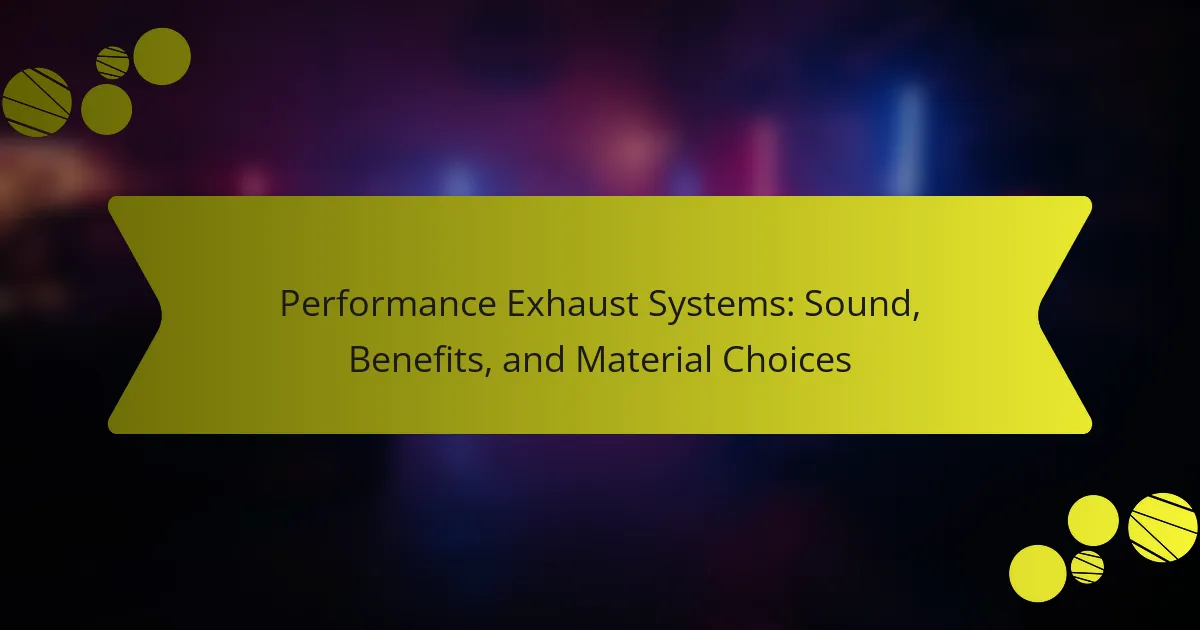Performance exhaust systems enhance vehicle performance by improving airflow and increasing horsepower. They provide a deeper, more aggressive sound profile while offering various material choices like stainless steel and titanium. Key benefits include improved fuel efficiency and customization options for sound. Understanding these systems helps drivers make informed decisions for their vehicles.

What are Performance Exhaust Systems and How Do They Work?
Performance exhaust systems enhance vehicle performance by improving exhaust flow. They work by reducing back pressure and optimizing sound quality. Key benefits include increased horsepower, improved fuel efficiency, and a more aggressive sound profile. Common materials include stainless steel and aluminized steel, each offering unique durability and weight characteristics.
What are the key components of a performance exhaust system?
A performance exhaust system consists of several key components that enhance vehicle performance. These components include the exhaust manifold, catalytic converter, resonator, muffler, and exhaust pipes. Each part plays a crucial role in improving airflow, reducing back pressure, and optimizing sound.
The exhaust manifold collects exhaust gases from the engine and directs them into the exhaust system. The catalytic converter reduces harmful emissions while maintaining performance. The resonator fine-tunes the exhaust sound, and the muffler minimizes noise levels. Finally, the exhaust pipes transport gases away from the vehicle.
Material choices for performance exhaust systems often include stainless steel for durability and weight reduction, while some systems utilize titanium for enhanced performance. Overall, these components work together to improve engine efficiency and sound quality.
How do performance exhaust systems enhance engine efficiency?
Performance exhaust systems enhance engine efficiency by improving exhaust flow and reducing back pressure. This leads to better combustion, resulting in increased horsepower and torque. Additionally, these systems often use lightweight materials, which reduce overall vehicle weight, further enhancing performance. Overall, a performance exhaust system optimizes engine output and fuel efficiency.

What are the sound characteristics of performance exhaust systems?
Performance exhaust systems produce a distinctive sound characterized by a deeper, more aggressive tone compared to stock systems. This sound is influenced by design elements such as pipe diameter, muffler type, and material choice.
Larger diameter pipes enhance exhaust flow, resulting in a louder sound. Performance mufflers, designed to minimize restrictions, also contribute to a more pronounced exhaust note. Materials like stainless steel offer durability and a sharper sound, while mild steel may produce a warmer tone.
The unique attribute of performance exhaust systems is their ability to enhance the auditory experience of a vehicle, appealing to enthusiasts seeking improved sound quality alongside performance benefits.
How does exhaust design influence sound quality?
Exhaust design significantly influences sound quality by altering exhaust flow dynamics. The shape, length, and material of the exhaust system affect sound waves, creating distinct tones and volumes. For example, a straight pipe design typically produces a louder, more aggressive sound, while a muffled design results in a quieter, refined tone. Additionally, the choice of materials, such as stainless steel versus mild steel, can impact sound characteristics, with stainless steel often providing a more resonant sound due to its durability and density.
Which materials produce different sound profiles?
Different materials create distinct sound profiles in performance exhaust systems. Stainless steel offers a sharp, aggressive tone, while aluminized steel produces a deeper, more resonant sound. Titanium is lightweight and provides a high-pitched, race-inspired note. Carbon fiber can create a unique, throaty growl, enhancing the overall aesthetic. Each material choice impacts the exhaust’s sound, durability, and weight.

What benefits do performance exhaust systems provide?
Performance exhaust systems enhance vehicle performance by improving airflow, increasing horsepower, and providing a deeper exhaust sound. They typically use lightweight materials like stainless steel or titanium, which contribute to durability and corrosion resistance. Additionally, these systems can optimize fuel efficiency, leading to better mileage. The unique attribute of performance exhaust systems is their ability to customize sound profiles, allowing drivers to achieve a desired acoustic experience while driving.
How do they improve horsepower and torque?
Performance exhaust systems improve horsepower and torque by enhancing exhaust flow and reducing backpressure. This allows the engine to breathe more freely, increasing efficiency and power output. High-performance materials, such as stainless steel or titanium, contribute to durability and weight reduction. Additionally, tuning options can optimize sound and performance characteristics, further enhancing driving experience.
What are the fuel efficiency implications of upgrading exhaust systems?
Upgrading exhaust systems can enhance fuel efficiency by improving engine performance and reducing back pressure. A performance exhaust system optimizes airflow, which can lead to better combustion and increased power. As a result, vehicles may achieve higher miles per gallon. Additionally, lighter materials like stainless steel or titanium can further contribute to efficiency by reducing overall vehicle weight.
Which performance exhaust systems are most popular among enthusiasts?
Popular performance exhaust systems among enthusiasts include brands like Borla, MagnaFlow, Flowmaster, and Corsa. These systems are favored for their ability to enhance engine sound, improve horsepower, and utilize high-quality materials like stainless steel. Enthusiasts often seek systems that offer a balance of aggressive sound and performance benefits. Borla’s S-Type is noted for its deep tone, while MagnaFlow is recognized for its smooth sound and durability. Flowmaster is known for its distinctive growl, and Corsa offers innovative designs that minimize drone. Each brand provides unique attributes that cater to different preferences and vehicle types.

What material choices are available for performance exhaust systems?
Performance exhaust systems are available in various materials, each offering distinct advantages. Common choices include stainless steel, aluminized steel, titanium, and carbon fiber.
Stainless steel is durable and resistant to corrosion, making it a popular choice. Aluminized steel is cost-effective but less durable than stainless. Titanium is lightweight and offers excellent performance but at a higher price point. Carbon fiber provides a unique aesthetic and reduced weight, appealing to enthusiasts seeking performance and style.
Each material choice impacts sound, weight, and overall performance, allowing customization based on individual preferences.
How do stainless steel and aluminized steel compare?
Stainless steel offers superior corrosion resistance compared to aluminized steel, making it more durable in harsh environments. Aluminized steel, however, is lighter and often more cost-effective.
| Attribute | Stainless Steel | Aluminized Steel |
|————————–|———————|———————-|
| Corrosion Resistance | High | Moderate |
| Weight | Heavier | Lighter |
| Cost | Higher | Lower |
| Heat Resistance | Excellent | Good |
| Lifespan | Longer | Shorter |
What are the advantages of titanium exhaust systems?
Titanium exhaust systems offer several advantages, including reduced weight, improved durability, and enhanced performance. Their lightweight nature leads to better acceleration and handling. Titanium’s resistance to corrosion ensures longevity, making it a cost-effective choice over time. Additionally, these systems produce a distinct sound that many enthusiasts prefer.
Which materials are best for specific vehicle types?
Performance exhaust systems vary in material choice based on vehicle types. Stainless steel is ideal for durability in performance cars, while aluminum is lightweight for racing vehicles. Titanium offers superior strength and heat resistance, suitable for high-performance applications. Mild steel is cost-effective for everyday vehicles. Each material impacts sound, weight, and longevity, influencing overall performance.

What factors should be considered when selecting a performance exhaust system?
When selecting a performance exhaust system, consider sound, benefits, material choices, and compatibility with your vehicle.
Sound is crucial as it affects the overall driving experience. Performance benefits include increased horsepower and torque, which enhance vehicle performance. Material choices, such as stainless steel versus aluminized steel, impact durability and weight. Lastly, ensure compatibility with your vehicle’s make and model to avoid installation issues.
How does vehicle compatibility affect exhaust system choice?
Vehicle compatibility significantly influences exhaust system choice by determining fit, performance, and sound characteristics. Each vehicle model has specific design requirements that affect the exhaust system’s diameter, length, and mounting points. Choosing an incompatible exhaust can lead to poor performance, increased noise, or installation challenges. For example, a performance exhaust designed for a sports car may not fit a truck due to size and design differences. Therefore, selecting an exhaust system tailored to a vehicle’s specifications ensures optimal performance and sound enhancement.
What are the legal considerations for aftermarket exhaust systems?
Aftermarket exhaust systems may face legal considerations regarding emissions, noise levels, and safety regulations. Compliance with local and federal laws is essential to avoid penalties. For example, systems must meet Environmental Protection Agency (EPA) standards. Additionally, some states have specific noise ordinances that aftermarket systems must adhere to. Always check local regulations before installation to ensure legality and avoid potential fines.

What are the unique features of high-end performance exhaust systems?
High-end performance exhaust systems feature advanced materials, optimized airflow, and distinctive sound profiles. These systems often utilize lightweight materials like titanium or high-grade stainless steel, enhancing durability while reducing weight. Unique design elements, such as mandrel bends, improve exhaust flow, resulting in better engine performance. Additionally, they offer customizable sound options, allowing drivers to tailor their vehicle’s acoustic profile.
How do advanced technologies enhance exhaust performance?
Advanced technologies significantly enhance exhaust performance by optimizing airflow, reducing backpressure, and improving sound quality. These systems utilize advanced materials like titanium and carbon fiber, which are lighter and more durable. Additionally, electronic controls enable precise tuning of exhaust valves, allowing for better engine efficiency and performance. The integration of sensor technology further aids in real-time adjustments, ensuring optimal performance under varying driving conditions.
What differentiates premium brands in the market?
Premium brands in the performance exhaust systems market stand out due to superior materials, enhanced sound quality, and notable performance benefits. High-quality stainless steel or titanium construction offers durability and weight savings. These brands often provide a deeper, more aggressive exhaust note, enhancing the driving experience. Additionally, premium systems typically result in improved horsepower and torque, appealing to performance enthusiasts.

What are some common misconceptions about performance exhaust systems?
Many misconceptions about performance exhaust systems include the beliefs that they only increase noise, are illegal, and require extensive modifications. In reality, performance exhaust systems enhance engine efficiency, improve horsepower, and can be designed to meet legal noise regulations. Additionally, they come in various materials, such as stainless steel and aluminized steel, each offering unique benefits. Misunderstandings often overlook these advantages, focusing solely on sound rather than performance and durability.
How does a louder exhaust not always mean better performance?
A louder exhaust does not always mean better performance because sound levels do not directly correlate with engine efficiency or power output. Performance exhaust systems are designed to enhance airflow, reduce back pressure, and improve engine performance. However, factors like exhaust design, material choices, and tuning play critical roles. For instance, a well-designed system may produce a moderate sound while significantly boosting performance. Additionally, louder exhausts can sometimes lead to increased weight or unwanted resonance, which may negatively impact overall performance.
What are the myths surrounding exhaust backpressure?
Many myths exist about exhaust backpressure, often misrepresenting its impact on performance exhaust systems. One common myth is that higher backpressure always enhances engine performance. In reality, optimal backpressure is necessary for maintaining engine efficiency, but excessive backpressure can hinder performance.
Another myth suggests that performance exhaust systems solely focus on sound enhancement. While sound is a noticeable attribute, the primary benefits include improved exhaust flow, increased horsepower, and better fuel efficiency.
Some believe that only specific materials, like stainless steel, provide the best performance. However, various materials such as aluminized steel and titanium also offer unique advantages, including weight savings and corrosion resistance.
Understanding these myths helps clarify the true benefits and considerations for choosing performance exhaust systems.

What are the best practices for maintaining performance exhaust systems?
To maintain performance exhaust systems effectively, follow these best practices. Regular inspections help identify issues early. Clean the system to prevent rust and buildup. Ensure proper installation to avoid leaks. Use high-quality materials for durability. Monitor sound levels to ensure optimal performance.
How can regular checks prevent performance issues?
Regular checks can significantly reduce performance issues in exhaust systems by identifying problems early. Routine inspections help detect leaks, blockages, and wear, ensuring optimal function. For instance, monitoring sound can reveal irregularities in flow, indicating potential failures. Regular maintenance also extends the lifespan of materials used, such as stainless steel or aluminized steel, enhancing durability. Ultimately, proactive checks prevent costly repairs and improve vehicle efficiency.
What are the signs that an exhaust system needs replacement?
Signs that an exhaust system needs replacement include excessive noise, rust or corrosion, decreased fuel efficiency, and visible exhaust leaks. These indicators suggest that the performance exhaust system may be failing and requires attention. Regular inspection can help identify these issues early, ensuring optimal vehicle performance.
What tips can ensure optimal performance and longevity?
To ensure optimal performance and longevity of performance exhaust systems, prioritize regular maintenance, quality materials, and proper installation.
1. Conduct routine inspections to identify wear and tear.
2. Use high-grade stainless steel or titanium for durability.
3. Ensure correct alignment to prevent leaks.
4. Choose systems designed for your vehicle’s specific performance needs.
5. Regularly clean components to prevent buildup and corrosion.



